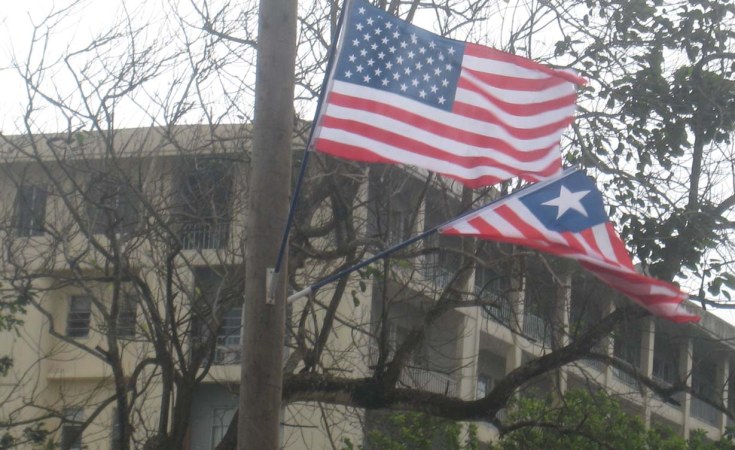Catherine Rodriguez, Chargé d'Affaires of the U.S. Embassy near Monrovia, has called on the Joseph Boakai administration to prioritize the fight against corruption as it is paramount to the Liberian people.
She added that many Liberians are eager to see those involved in or accused of corruption or human rights violations prosecuted.
''It is really incumbent on the Boakai administration to fight corruption, and we are here to help, but the government has to want it, civil society has to want it, the media, and more importantly, the Liberian people need to want it,'' Rodriguez added.
Rodriguez's call yesterday was in response to a question asked by a journalist at a press roundtable meeting. ''What message for the incoming administration in terms of prosecuting the sanctioned officials?''
''I would say that the incoming administration needs to do what is best for the Liberian people, and I think based on what I have seen on social media, these sanctions were viewed favorably, which means that the people of Liberia want to see the new government fight corruption.''
Rodriguez highlighted the U.S. government's unwavering commitment to accountability, human rights, and the use of sanctions as a powerful tool in the fight against corruption. ''Sanction is a tool, and we hope that the media will look into these sanctions and report for the public. Civil society will ask that investigation be taken to look into these actions. These are just tools. It really relies on you all -- the media and civil society--to push these issues forward,'' she said.
Rodriguez's comments came after the U.S. Treasury's Office of Foreign Assets and Control (OFAC) under its Global Magnitsky Human Rights and Accountability Act, sanctioned Jefferson Koijee, the Monrovia City Mayor and secretary general of the Coalition for Democratic Change (CDC).
''Today OFAC designated Jefferson Koijee, who is the mayor of Monrovia, Liberia, and is a senior leader in the Congress for Democratic Change (CDC) political party,'' the Treasury Department's OFAC announcement, released on December 8, said. ''Koijee has a reputation for stoking violence and has a powerful grip on Monrovia's youth. He controls paramilitary-style organizations associated with the CDC, which allegedly recruits ex-combatants and recently released prisoners. OFAC has reason to believe that Koijee has instructed these organizations to violently disrupt demonstrations conducted by government critics or political opposition.''
The U.S. government, through its Department of State, also designated Senate Pro-Tempore Albert Chie, Minister of Finance Samuel Tweah, as well as former Speaker of the House of Representatives and current Margibi County Senator Emmanuel Nuquay for human rights abuse and corruption.
''Pursuant to Section 7031(c), the United States is publicly designating Tweah, Chie, and Nuquay for their involvement in significant corruption by abusing their public positions through soliciting, accepting, and offering bribes to manipulate legislative processes and public funding, including legislative reporting and mining sector activity. As part of this action, their immediate family members are also designated, including their spouses Delecia Berry Tweah, Abigail Chie, and Ruthtoria Brown Nuquay, and Tweah and Nuquay's minor children,'' says a US State Department statement.
The sanctions, which are the first of its kind since it was passed by U.S. Congress in 2012 on Liberian public officials, are intended to punish officials involved in corruption and human rights abuse.
The Act authorizes the President of the United States to block or revoke the visas of those sanctioned, including properties for extrajudicial killings, torture, or other gross human rights violations of internationally recognized human rights laws. The act promotes respect for human rights, accountability, and the rule of law. These sanctions can take the form of asset freezes for funds held in US banks and bans on visas for those coming to the US.
The Global Magnitsky Act functions as a deterrent, forcing foreign officials at all levels who would use unlawful violence or corruption to consider repercussions from the US government.
Highly celebrated, the sanctions have been described by many Liberians as a "payback" for officials who were already accused of corruption. Since assuming office in 2018, the President Weah administration has been accused of corruption, including the US$16 billion saga. The U.S. government has been one of the international partners that promotes accountability and rule of law, calling on the George Weah administration to follow suit.
The latest sanctions are in line with the US government efforts to weed out corrupt offficails and hold them accountable. In an email to the Observer in October 2023, Ledgerhood Rennie, Liberia's Minister of Information asked: ''How does the Government of Liberia proceed with the prosecution of these individuals when they have not broken any laws in the country?''
''Liberia has not domesticated the Magnitsky Act , nor has the US Government made privy to the Liberian Government the evidence gathered that led to its sanctioning of these former government officials. How then can the government proceed with prosecuting these people?''
According to him, in the US, as in Liberia, an accused person is presumed innocent until convicted by a competent jurisdictional court.


